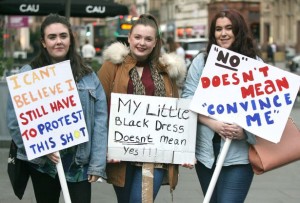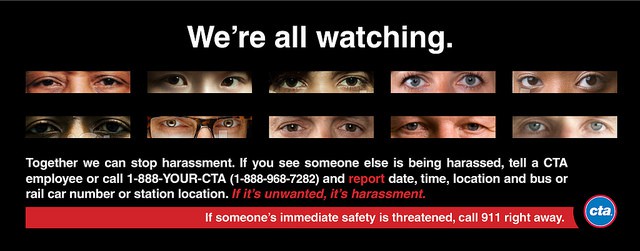Here are relevant news articles from the past few weeks.
Montreal Gazette, “Montreal police urge transit users to report sexual predators, help victims“
“Police in the Montreal region launched a campaign to encourage transit users to report incidents of sexual harassment on the métro, buses and trains. Many victims of sexual touching talk about their experience on social media or report it to transit authorities, but are reluctant to file a police report, said Inspector Carole Lalonde of the Montreal police’s métro division.”
Chicago Reader, “Could woman-only el cars prevent sexual harassment on the CTA?”
“The agency is addressing the problem through a new informational campaign. ‘If It’s Unwanted, It’s Harassment’ warns would-be offenders that abusive behavior will not be tolerated.
The centerpiece of the campaign is a new line of rail and bus advertisements encouraging riders who see a fellow passenger being hassled to speak up, contact CTA personnel via an onboard intercom, or call 911 if there’s an immediate safety threat.
But some of the credit for the new initiative should go to the Courage Campaign, a grassroots organization launched in 2014 by Uptown resident Kara Crutcher to fight harassment on the CTA. Last year the group successfully lobbied the agency to shift its focus from simply asking victims to report incidents to preventing abusive behavior by raising awareness of the problem.
‘We’re happy to see a couple of CTA ads up regarding harassment,’ Crutcher said. ‘It is definitely a step in the right direction. . . . Personally, I hope that we can work with them to produce more educational ads, but we shall see.’
As for female-only cars, while Crutcher says these could provide a safe space for women suffering from post-harassment PTSD, she argues they’re a Band-Aid solution that doesn’t get to the root of the problem.
‘A cultural shift must occur,’ she says. ‘We must recognize and respect each other everywhere, but especially in these public spaces. . . . Putting men in a train car separate from me will not stop them from harassing me when we exit the train. But education, antistreet harassment advocacy, and courage might.””
Guardian, “‘I cried all the way back’: sexual harassment on public transport“
“How does it feel to be subject to unwanted sexual attention on your morning commute? Or on your way to school? We asked readers to tell us their stories of sexual harassment on public transport … Some told us about being followed off trains. Others told us about men trying to sneak a feel of their breasts between shopping bags. Then there were those who witnessed public masturbation, or were just teenagers when they were first subject to unwanted sexual attention. These experiences were not limited to those living within the jurisdiction of Transport for London.”
Nepal Republic Media, “Public transport is living hell for young women“
“Many young women and girls in Kathmandu Valley don’t like to use public transport because of sexual harassment, which is rife despite several attempts by the authorities to tackle the problem.

Liverpool Echo, “Women took to the streets of Liverpool to Reclaim the Night“
“It was the fourth year in a row that Liverpool has hosted the event, a campaign to raise awareness of womens’ right to walk free from abuse and assault on the streets.
Around 100 campaigners met outside Liverpool Town Hall and then marched past the bombed out church to the Liverpool Guild of Students for a rally…
Kate Menear, RTN Liverpool communications officer, said: ‘We’re basically just demonstrating that women have the right to walk freely at night without fear of violence. We’re campaigning against street harassment and gender violence in all its forms.’
Reclaim the night began in Leeds in 1977 inspired by Take Back the Night marches which took place in Germany the same year.”
Daily News, “Taxi and Limousine Commission puts sexual harassment rules for cabbies on hold“
“The Taxi and Limousine Commission slammed the brakes on explicit new definitions for sexual harassment on Thursday in the face of outrage from the industry.
The rule would have put specific definitions of sexual contact and sexual harassment on the books, plus a bigger $2,000 penalty for violations.
Under the new definition, hacks would have to steer clear of “any conversation related to sexual acts and sexual contact” and remarks about appearance, gender, sexual conduct or “desire to enter into any type of relationship with another person.”
But commissioners agreed to withdraw the proposed rule in order to fine tune it for next month’s meeting.
Opponents in the taxi industry argued there were too few sexual harassment or assault complaints to justify specific rules telling cabbies to keep creepy conversation to themselves.
They also feared that drivers would fall victim to false allegations.”
The Huffington Post, “14 Perfect Responses To People Who Want Harriet Tubman To Smile“
“It was announced that Harriet Tubman, an iconic “conductor” on the Underground Railroad who helped lead hundreds of other slaves to freedom, would replace former President Andrew Jackson on the front of the $20 bill. Though it’s been reported that the change may not go into effect until 2030, the idea of having a woman, especially a woman of color, on the bill sparked celebration for many people. But others weren’t so happy with — wait for it — the way Tubman’s face looked.
A quick scan on Facebook or Twitter turns up several posts from people who want Tubman to look more cheerful on the $20 bill and to smile (you know, because women should smile all the time).”
The Guardian, “Right to the city: can this growing social movement win over city officials?“
“‘We need a multitude of perspectives in participation to ensure we are building inclusive, resilient cities with social cohesion,’ says Kathryn Travers, director of Women in Cities International, who have partnered with Plan International and UN-Habitat on the programme. Enabling these girls to have a say in shaping better public spaces is critical in a context where women around the world continue to face harassment and violence in the urban realm: of the girls that the programme have worked with, 24% of them said that they never feel safe in public places. ‘It’s crucial that women and girls are consulted,’ Travers adds. ‘Gender gaps in cities lead to exclusion in public spaces. In some cities, upwards of 90% of women experience daily sexual harassment in public space.'”
The Fiji Times, “Street Harassment“
“She said constant sexist remarks such as uro, chrabi, sexy, chalega, and gandu was increasing day by day.
“The callings out from a passing vehicle, the slight passing of men’s hands on your body or the grabbing of the buttocks or breasts were forms of street harassment,” Ms Naidu said.
She said masturbating to women in public spaces, whistling and singing was also common.
“These unsolicited comments, unwanted grabbing, leering and gestures of sexual nature is something that women and girls experience daily.
“These are experienced by some as young as 14 years and boys as young as 12 years carry out such acts of street harassment.”
She said through the One Billion Rising Fiji and Take Back the Streets Fiji, advocacy and awareness campaigns had been carried out targeting this everyday form of violation of women.”
Daily Life, “Where is the line between normal behaviour and harassment?”
“Street harassment begins to look a lot more like a part of the routine objectification, oppression and social exclusion of women, LGBTIQ people, people of colour and people living with disabilities. It’s not a compliment. It is a form of violence and abuse with serious consequences. It has to stop.”
Mashable, “Comedian Jen Kirkman takes on street harassment with powerful retweets“
“Comedian Jen Kirkman turned her Twitter account into a platform for women to share their harrowing stories about street harassment on Tuesday.
Kirkman, who has 175,000 followers, has been performing in Melbourne, Australia, and said she encountered a group of men at 11 p.m. who called her a “bitch” for not answering when they said she was wearing a nice coat.
Melbourne men. When I walk alone &.4 of you yell “nice coat” I’m not a “bitch” not answering.Yell that at a dude. See if he doesn’t beat you
— Jen Kirkman (@JenKirkman) April 3, 2016
Her tweet about the incident garnered sexist responses from some men, but many women shared their sympathy and snippets of past similar experiences. It wasn’t long before Kirkman began retweeting those stories, which collectively demonstrate how street and sexual harassment are pervasive and insidious.
I will now RT every woman who had experienced street harassment even in broad daylight by “normal men”. Dudes. Don’t mute this. Begin!
— Jen Kirkman (@JenKirkman) April 4, 2016″

